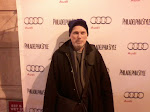One expert's view of the late Professor Creeley
I have been certified as an expert in the life and work of ten people: W.H. Auden, Daniel Berrigan, John Cage, Gregory Corso, Robert Creeley, James Dickey, Allen Ginsberg, Denise Levertov, Andy Warhol, and James Wright. The list is accidental. I wanted to interview Ezra Pound, for example, and discussed the matter on the phone with Olga Rudge; but, before I could fly to Italy, Pound died. I read every one of John Ashbery’s publications many times, prepared questions for an interview, and had my tape recorder ready; but an hour before the interview was to begin, Ashbery phoned to cancel.
Robert Creeley tried to write for a living. That writing, done in the Fifties and early Sixties, is generally admired and recognized. And the recognition led to prestigious teaching jobs. But talking about literature to adoring students can turn to neglect of the painful and difficult labor of serious creativity. It happens all the time.
Robert Creeley tried to write for a living. That writing, done in the Fifties and early Sixties, is generally admired and recognized. And the recognition led to prestigious teaching jobs. But talking about literature to adoring students can turn to neglect of the painful and difficult labor of serious creativity. It happens all the time.


10 Comments:
What do you know about the Christian aspect of Levertov's career? She apparently turned Christian in 1984, and lived until 1997. Did she attend a church regularly? Have you read Evening Train? Or any of the later collections?
Levertov's father was a German rabbi who moved to England and sought at first to reconcile Judaism and the Church of England. With the rise of Hitler, he switched his attention to German Jewish refugees. I don't know about church attendance, but Levertov, judging from her poetry, clearly became more Christian and religious towards the end of her life.
I ordered Evening Train. I saw her read in 1993 or 1994 in Seattle. She was good, rather sad. Seemed to want love from the audience. An air of twilight over her or something, and yet the Christianity seemed quite apparent. I didn't know her or her work. Where do you rank her in terms of quality amongst your other poets? Where do you place her in comparison to Corso?
I've never ranked these ten people. Auden and Cage seemed the most honest and intelligent, Dickey the least. Corso disavowed Christianity because Ginsberg so ordered; but Creeley also genuflected at this Beat credo. I've lately been reading a posthumous selection of Levertov's anti-war poems.
One method of ranking is to think: which of these has eaten up more of my thinking on a daily basis? Which one COMMANDS more attention?
Could you now rank them, please?
The only female poet who is pro-war (that I know of) is MArianne Moore. In distrust of Merits.
I'm reading LEvertov's book Evening Train and think the anti-war poems are gorgeous but just plain wrong.
She writes for instance,
war/ means blood spilling from living bodies/ means severed limbs, blindness, terror/ means grief, agony, orphans, starvation/ prolonged mistery, prolonged resentment and hatred and guilt/ means all of these multiplied, multiplied/ means death, death, death, and death.
Well sorta true. But peace can mean the same thing if it means that you let Hitler ride roughshod over Jews, or if you let Stalin destroy the Ukraine, or if you let the situation in the Darfur go unchallenged.
She's saying something like don't fight tooth decay, it's going to mean dental pain. Yes, it is. But perhaps less if you go after it right away.
The citizens of Vietnam now earn 324 dollars a year. That's what peace got them: prolonged misery.
There is also Julia Ward Howe's Battle Hymn of the Republic come to think of it.
Most great poets are war poets. For twenty years, of and on, I've struggled with Clyde Pharr's Homeric Greek. Pharr uses The Iliad as a grammar book, and more.
I'm not interested in arguing the relative achievements of poets. I think of Gregory more than Denise, but, then, I published a lot of Gregory's poetry. He stayed with me. He's the only junkie I got to know well; one junkie should suffice.
At the end of one rough night on the town with Gregory, we crashed on the floor of an Upper West Side art historian. On the subway downtown the next morning, I was hung over. Gregory said, "You can say all the mean things you want about heroin, but I have never felt as bad as you obviously feel now."
Denise never tried to tempt me into bad drugs. She merely had the idea peace was possible.
But if the cause be not good, the King himself hath a heavy reckoning to make when all those legs and arms and heads chopped off in a battle shall join together at the latter day and cry all "We died at such a place"-- some swearing, some crying for a surgeon, some upon their wives left poor behind them, some upon the debts they owe, some upon their children rawly left. I am afeard there are few die well that die in battle, for how can they charitably dispose of anything when blood is their argument? Now if these men do not die well, it will be a black matter on the King that led them to it.... --Henry V, Act IV, Sc 1, l. 153
What evening did the drinking with Corso happen? Can you date it? Who was the art historian? I want to get little glimpses of Corso into the Corso biography, but they must be dated exactly. Nice little anecdote.
Post a Comment
Subscribe to Post Comments [Atom]
<< Home